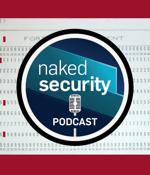Security News

DOUG. Remote code execution, remote code execution, and 2FA codes in the cloud. The remote code execution bug they patched at the end of March 2023.

DOUG. Juicejacking, public psychotherapy, and Fun with FORTRAN. All that and more on the Naked Security podcast. DOUG. Well, you might say, "You can't spell 'FORTRAN' without 'fun'."
![S3 Ep130: Open the garage bay doors, HAL [Audio + Text]](/static/build/img/news/s3-ep130-open-the-garage-bay-doors-hal-audio-text-small.jpg)
DOUG Patches aplenty, connected garage doors, and motherboard malfeasance. DUCK I am still trying to make sense of when you said "Connected garage doors", Doug.

DOUG. Wi-Fi hacks, World Backup Day, and supply chain blunders. DUCK. Very simply put, the only backup you will ever regret is the one you did not make.
![S3 Ep128: So you want to be a cybercriminal? [Audio + Text]](/static/build/img/news/s3-ep128-so-you-want-to-be-a-cybercriminal-audio-text-small.jpg)
DOUG. Honeypots, patches and the passing of an icon. DUCK. I know where I want it to stop, Doug!

They found this bug in the app on Google Pixel Phones that lets you take a screenshot, or a photo you've captured, and crop it, or blank out bits of it. Google Pixel phones had a serious data leakage bug - here's what to do!
![S3 Ep 126: The price of fast fashion (and feature creep) [Audio + Text]](/static/build/img/news/s3-ep-126-the-price-of-fast-fashion-and-feature-creep-audio-text-small.jpg)
No audio player below? Listen directly on Soundcloud. You can listen to us on Soundcloud, Apple Podcasts, Google Podcasts, Spotify, Stitcher and anywhere that good podcasts are found.
![S3 Ep125: When security hardware has security holes [Audio + Text]](/static/build/img/news/s3-ep125-when-security-hardware-has-security-holes-audio-text-small.jpg)
Ransomware bust, ransomware warning, and anti-ransomware advice. DOUG. Ransomware, more ransomware, and TPM vulnerabilities.
![S3 Ep124: When so-called security apps go rogue [Audio + Text]](/static/build/img/news/s3-ep124-when-so-called-security-apps-go-rogue-audio-text-small.jpg)
DOUG. Scambaiting, rogue 2FA apps, and we haven't heard the last of LastPass. Alright, let's stay on the subject of 2FA. We are seeing a spike in rogue 2FA apps in both app stores.
![S3 Ep123: Crypto company compromise kerfuffle [Audio + Text]](/static/build/img/news/s3-ep123-crypto-company-compromise-kerfuffle-audio-text-small.jpg)
DOUG. Crypto company code captured, Twitter's pay-for-2FA play, and GoDaddy breached. DOUG. Well, let's bring things into the modern, and talk about GoDaddy.